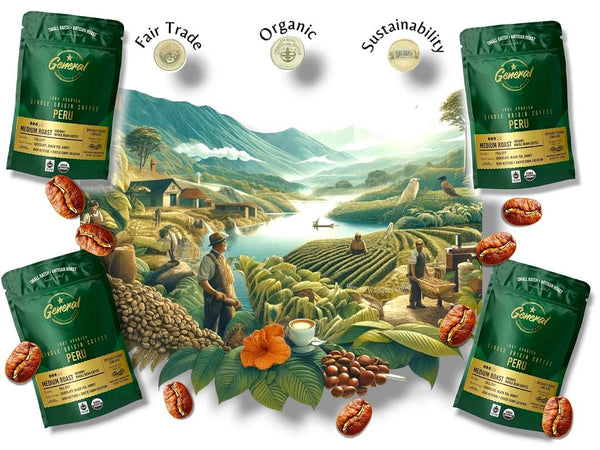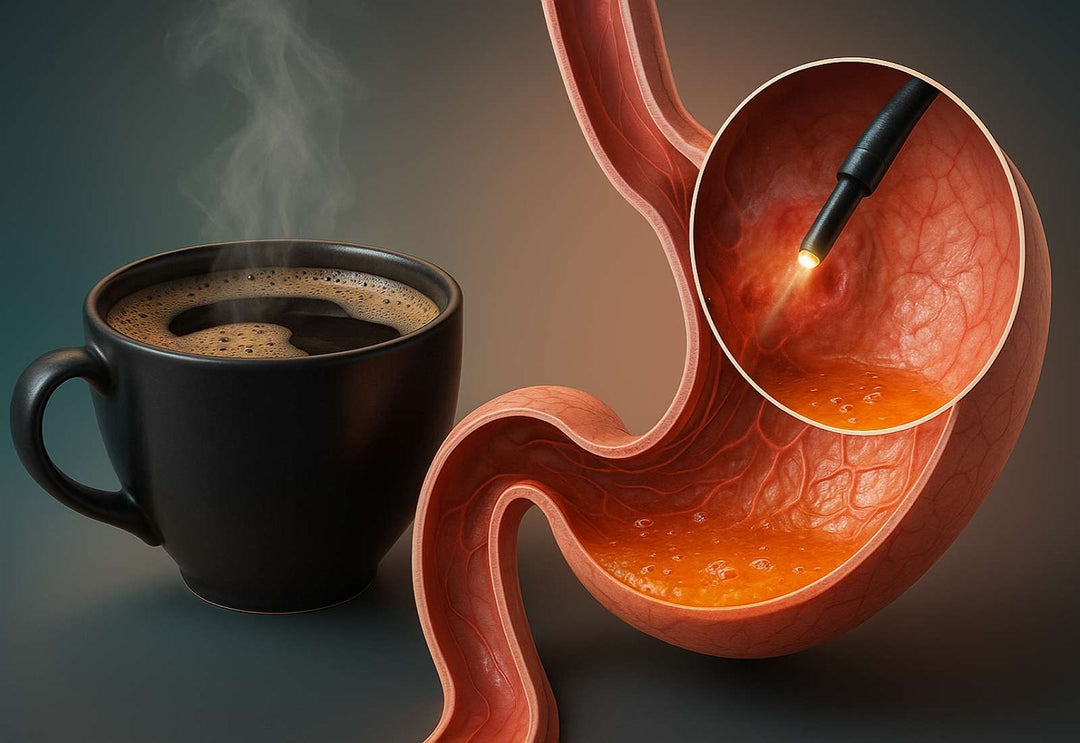Is Organic Coffee Better for You and the Environment?
Why Choose Organic Coffee? An Introduction to Its Benefits

In a world where health-conscious consumers crave more than just a morning pick-me-up, organic coffee emerges as the perfect brew catering to both taste and well-being. With its remarkable health benefits and eco-friendly production methods, organic coffee has become a delectable elixir nurturing the mind, body, and planet.
Organic coffee is a rewarding choice for those seeking a delicious and guilt-free beverage. Grown without synthetic fertilizers or pesticides, it offers a clean and pure cup of java delivering an exceptional taste experience. Rich in antioxidants and essential nutrients, such as vitamin B2 and magnesium, organic coffee can enhance brain function, boost energy levels, and support overall health.
Moreover, by choosing organic coffee, you're not just benefiting yourself but also the planet. Organic farming practices promote soil and water conservation, biodiversity, and the well-being of coffee farming communities. By savoring a cup of organic coffee, you are contributing to a sustainable future.
Indulge in the enticing flavors and a guilt-free caffeine fix with organic coffee. Experience a brew that tantalizes your taste buds, nourishes your body, and supports the environment.
What Is Organic Coffee? Understanding Its Benefits and Production

Organic coffee is a specialty coffee grown and processed without synthetic chemicals such as fertilizers, pesticides, or herbicides. Instead, organic coffee farmers rely on natural methods to maintain soil fertility and control pests and weeds, including compost, cover crops, and beneficial insects. The result is a coffee free from harmful chemicals, offering a pure, unadulterated taste experience.
Organic coffee is produced in accordance with strict regulations and certification standards set by various governing bodies, such as the United States Department of Agriculture (USDA) or the European Union. These standards ensure the coffee is grown, harvested, and processed in an environmentally-friendly and socially responsible manner. Organic coffee farms prioritize biodiversity, soil health, and worker well-being, making it a more sustainable and ethical choice for coffee lovers.
By choosing organic coffee, consumers can be confident they are supporting a more sustainable and equitable coffee industry. Organic farming practices benefit the environment and the communities that rely on coffee production for their livelihoods. With its commitment to quality, sustainability, and social responsibility, organic coffee is becoming increasingly popular among health-conscious consumers seeking a delicious and guilt-free caffeine fix.
Organic vs. Conventional Coffee: Key Differences Explained

The primary difference between organic and conventional coffee lies in the farming practices used to cultivate the coffee beans. Conventional coffee production often relies on synthetic fertilizers, pesticides, and herbicides to maximize crop yields and control pests and weeds. While these methods may increase short-term productivity, they can have detrimental effects on the environment and human health.
Organic coffee, on the other hand, is grown using natural and sustainable methods prioritizing soil health, biodiversity, and ecosystem well-being. Organic farmers rely on techniques such as crop rotation, cover cropping, and natural pest-control methods to maintain soil fertility and control pests. This approach results in a coffee free from harmful chemicals, offering a more authentic and flavorful taste profile.
Furthermore, organic coffee production is subject to rigorous certification and labeling requirements, ensuring the coffee is grown and processed in accordance with strict environmental and social standards. This includes fair wages and safe working conditions for coffee farmers and their communities. By choosing organic coffee, consumers can be confident they are supporting a more sustainable and ethical coffee industry.
Is Organic Coffee Better for Histamine Intolerance and MCAS?

Histamine intolerance and Mast Cell Activation Syndrome (MCAS) are conditions that can make finding suitable foods and beverages challenging.
Histamine Intolerance:Histamine intolerance occurs when there is an imbalance between the amount of histamine ingested and the body’s ability to break it down. Histamine is a compound involved in local immune responses, regulating physiological function in the gut, and acting as a neurotransmitter. People with histamine intolerance have a deficiency or reduced activity of the enzyme diamine oxidase (DAO), which breaks down histamine in the gut. Symptoms of histamine intolerance can include headaches, skin rashes, gastrointestinal issues, and respiratory problems.
Mast Cell Activation Syndrome (MCAS):MCAS is a condition in which mast cells inappropriately and excessively release chemical mediators, including histamine, leading to a range of chronic symptoms. Mast cells are a type of white blood cell that play a role in allergic reactions and immune system defense. In MCAS, triggers such as certain foods, stress, or environmental factors can cause mast cells to release excessive histamine and other chemicals. Symptoms of MCAS can vary widely but often include gastrointestinal issues, cardiovascular symptoms, skin rashes, and neurological symptoms.
Organic Coffee for Histamine Intolerance and MCAS:For individuals with these conditions, choosing foods and beverages that are less likely to trigger symptoms is crucial. Organic coffee might be a better choice for those sensitive to histamines for several reasons:
-
Free from Synthetic Chemicals: Organic coffee is grown without synthetic pesticides and fertilizers, which can sometimes exacerbate histamine-related symptoms.
-
Fewer Additives: Organic coffee tends to have fewer additives and preservatives, which might reduce the risk of triggering histamine-related reactions.
- Potentially Lower Histamine Levels: While coffee itself can be a histamine liberator (triggering the release of histamine in the body), the absence of synthetic chemicals in organic coffee might make it a better option for some individuals.
However, it is important to note that coffee, in general, can still be a trigger for some individuals with histamine intolerance or MCAS. Therefore, it's essential to consult with a healthcare provider to determine if organic coffee is suitable for your specific condition.
What Are the Potential Health Benefits of Organic Coffee?

Organic coffee offers numerous potential health benefits, making it a superior choice over conventional coffee. One of the primary advantages is its high antioxidant content. Coffee beans, whether organic or conventional, are naturally rich in antioxidants such as chlorogenic acid and caffeic acid, which can help neutralize harmful free radicals in the body and potentially reduce the risk of chronic diseases.
However, the absence of synthetic pesticides and fertilizers in organic coffee cultivation means these beneficial compounds are not diluted or degraded by chemical residues. As a result, organic coffee typically contains higher levels of antioxidants compared to its conventional counterpart, theoretically providing greater protection against oxidative stress and inflammation.
In addition to its antioxidant properties, organic coffee is also a rich source of essential nutrients such as vitamin B2 (riboflavin) and magnesium. These nutrients play crucial roles in various bodily functions, including energy metabolism, nerve function, and bone health. By incorporating organic coffee into your daily routine, you can help ensure you are getting a steady supply of these important vitamins and minerals.
Does Organic Coffee Affect Mental Well-Being?

The benefits of organic coffee possibly extend beyond physical health, as it may also positively impact mental well-being. The caffeine in coffee is a well-known stimulant that can help improve focus, concentration, and cognitive performance. However, the absence of synthetic additives and preservatives in organic coffee means the caffeine is delivered more naturally and balanced, without the potential for jitteriness or energy crashes that can sometimes accompany conventional coffee consumption.
Furthermore, the antioxidants found in organic coffee may have neuroprotective properties, which can potentially help support brain health and cognitive function. Studies have suggested that regular consumption of organic coffee may be associated with a reduced risk of cognitive decline and neurodegenerative diseases, such as Alzheimer's and Parkinson's.
Beyond the physical and cognitive benefits, the ritual of savoring a cup of organic coffee can have a calming and relaxing effect on the mind. The aroma, flavor, and sensory experience of enjoying a well-crafted organic brew can help reduce stress and promote a sense of mindfulness and well-being. This can be particularly beneficial for individuals looking to incorporate more mindful and self-care practices into their daily lives.
What Impact Does Organic Coffee Have on the Body?

The potential health benefits of organic coffee extend beyond its antioxidant and nutrient content, as it may also positively impact various bodily functions. One of the most well-known benefits of coffee, in general, is its ability to boost energy levels and improve physical performance. The caffeine in coffee can help increase alertness, enhance focus, and delay the onset of fatigue, making it a popular choice for athletes, students, and busy professionals.
However, the lack of synthetic additives in organic coffee means the caffeine may be delivered in a more balanced and sustainable way, without the potential for energy crashes or jitteriness that can sometimes accompany conventional coffee consumption. This potential caffeine delivery may result in a more consistent and prolonged energy boost, particularly beneficial for individuals looking to maintain their physical and cognitive performance throughout the day.
In addition to its energy-boosting properties, organic coffee has also been linked to improved cardiovascular health. The antioxidants and other beneficial compounds found in organic coffee may help reduce inflammation, improve blood flow, and lower the risk of heart disease and stroke. Some studies have even suggested that regular consumption of organic coffee may be associated with a reduced risk of type 2 diabetes, thanks to its positive effects on insulin sensitivity and glucose metabolism.
How Organic Coffee Benefits the Environment?

The benefits of organic coffee aren't exclusive to human health, as it also plays a crucial role in promoting environmental sustainability. Organic coffee farming practices are designed to minimize the use of synthetic chemicals and promote biodiversity, soil health, and water conservation.
Unlike conventional coffee production, which often relies on chemical fertilizers and pesticides, organic coffee farms use natural methods, such as composting and the introduction of beneficial insects, to maintain soil fertility and control pests. This reduces the risk of soil and water contamination and supports the local ecosystem by providing a habitat for diverse plant and animal species.
Moreover, organic coffee production is often associated with fair trade and social responsibility initiatives, which aim to ensure that coffee farmers and their communities receive fair wages and have access to safe working conditions. By choosing organic coffee, consumers can be confident they are supporting a more sustainable and equitable coffee industry, positively impacting the environment and the communities that rely on coffee production for their livelihoods.
Understanding Mycotoxins in Organic Coffee

One of the concerns with coffee consumption is the presence of mycotoxins, which are toxic compounds produced by certain types of molds. These mycotoxins can be harmful if consumed in large quantities. Common foods that can contain mycotoxins include grains, nuts, dried fruits, and spices, in addition to coffee.
The mycotoxins of most concern in coffee are Ochratoxin A and Aflatoxins:
-
Ochratoxin A (OTA): This mycotoxin is produced by Aspergillus and Penicillium species and is known for its nephrotoxic (kidney-damaging) properties. OTA is a common contaminant in coffee and other food products.
- Aflatoxins: Produced by Aspergillus species, aflatoxins are among the most potent carcinogenic substances known. They can contaminate various food products, including coffee, and pose significant health risks.
The Food and Drug Administration (FDA) has established limits for mycotoxin levels in food products to protect consumers. For example, the FDA limits the allowable level of Ochratoxin A in coffee to 5 parts per billion (ppb). It is important to note that while it is nearly impossible to completely eliminate mycotoxins from coffee, various factors such as how the coffee is grown, handled, processed, roasted, and brewed can significantly impact mycotoxin levels (US Roast) (Royal New York).
Organic coffee is much less likely to contain significant mycotoxin levels because it is grown without synthetic pesticides, which can reduce the prevalence of mold growth on coffee plants. Additionally, practices like proper drying, storage, and roasting at high temperatures can help reduce mycotoxin levels. While General Warfield’s Coffee does not currently conduct specific mycotoxin testing, we operate out of an FDA-approved roasting facility, ensuring strict adherence to high standards of food safety and quality (Daily Coffee News by Roast Magazine) (vietnamcoffeebeans.com).
By choosing organic coffee from reputable brands like General Warfield’s Coffee, you can be assured that stringent quality control processes are in place to minimize the risk of mycotoxin contamination. Our commitment to high standards and rigorous safety protocols helps ensure that every cup of coffee is both safe and enjoyable.
Choosing and Brewing the Perfect Cup of Organic Coffee
Choosing and brewing the perfect cup of organic coffee can be a delightful and rewarding experience. When selecting organic coffee, it's important to look for certifications from reputable organizations, such as the USDA or the Organic Trade Association, to ensure the coffee has been grown and processed in accordance with strict environmental and social standards.
Additionally, consider the origin and roast profile of the coffee. Different coffee-growing regions can impart distinct flavor profiles, ranging from the bright and fruity notes of African beans to the rich and chocolatey tones of Latin American varieties. Similarly, the roast level can influence the coffee's taste, with lighter roasts often exhibiting more acidity and complexity, while darker roasts tend to be smoother and more full-bodied.
When brewing organic coffee, use high-quality equipment and follow best practices to ensure the delicate flavors and aromas are fully expressed. This can include using a burr grinder to ensure a consistent grind size and experimenting with different brewing methods, such as pour-over, French press, or automatic drip, to find the one that best suits your preferences.
Top Organic Coffee Brands to Experience
As the demand for organic coffee continues to grow, there are various high-quality brands and roasters to choose from. Some of the top organic coffee brands to consider include:
-
General Warfield’s Coffee: A family-owned and operated specialty coffee company from Maryland offering a Fair-Trade and USDA Organic certified Shade-Grown Peruvian whole bean roast and a Fair-Trade and USDA Organic certified Ugandan whole bean roast among many other gourmet coffee options. All our beans are specialty grade, antioxidant-rich, low-acid, and sourced from award winning and reputable cooperatives. Every purchase plants a tree, and our bags are nitrogen flushed and compostable. Our roasting facility is a state-of-the-art FDA registered and approved facility. Additionally, our artisan roasters have won multiple global awards for their small-batch, hand-crafted roasts. We are dedicated to crafting the best coffee roasts on the planet.
-
Lifeboost Coffee: Known for its high-altitude, shade-grown, single-origin coffee that is organic, fair trade, and free from mycotoxins.
-
Purity Coffee: Focuses on health benefits, offering coffee that is organic, high in antioxidants, and tested for mold and other contaminants.
-
Koffee Kult: A family-owned roaster specializing in small-batch, organic coffee blends focusing on sustainability and fair trade practices.
-
Grounds & Hounds: A socially conscious brand donating a portion of its profits to animal rescue organizations while also offering a selection of certified organic coffee.
- Café Altura: One of the oldest and most respected organic coffee companies in the United States, known for its commitment to sustainable farming and ethical sourcing.
By exploring these and other organic coffee brands, you can discover a world of exceptional flavors and aromas while supporting a more sustainable and equitable coffee industry.
The Future Outlook of Organic Coffee

As consumer awareness and demand for sustainable and ethical food and beverage choices continue to grow, the future of organic coffee looks increasingly bright. Organic coffee production is expected to continue expanding, driven by environmental concerns, health-conscious consumers, and a growing appreciation for the unique flavors and quality organic coffee can offer.
One of the key trends shaping the future of organic coffee is the increasing focus on traceability and transparency within the coffee industry. Consumers are becoming more interested in understanding the origins of their coffee, the farming practices used, and the social and environmental impact of their purchases. This has led to a rise in direct trade and single-origin organic coffee offerings, allowing consumers to connect more directly with the farmers and communities producing their coffee.
Additionally, the growing popularity of specialty and craft coffee culture has contributed to the rise of organic coffee. As consumers seek unique and high-quality coffee experiences, they increasingly turn to organic coffee to enjoy a delicious and guilt-free brew that aligns with their values and preferences.
Looking ahead, the future of organic coffee is likely to be shaped by continued advancements in sustainable farming techniques, innovative processing methods, and the development of new and diverse coffee varieties. As the coffee industry continues to evolve, organic coffee is poised to play a leading role in promoting a more sustainable and equitable future for both consumers and the communities that depend on coffee production for their livelihoods.
The Impact of Climate Change on Organic Coffee

Climate change poses a significant threat to coffee production worldwide, including organic coffee. Changes in temperature, precipitation patterns, and the increased frequency of extreme weather events can affect coffee yields, quality, and the suitability of land for coffee cultivation. Organic coffee farming, with its emphasis on sustainable practices, may be better equipped to adapt to these changes.
Techniques such as agroforestry, regenerative agriculture, crop diversification, and soil conservation can help mitigate the impacts of climate change. However, continued research and adaptation are essential to ensure the resilience of organic coffee in the face of a changing climate.
At General Warfield’s Coffee, we are committed to reducing our carbon footprint and mitigating the impacts of climate change. For every order, we plant a mangrove tree in Madagascar, which helps sequester carbon and restore vital ecosystems.
Additionally, our coffee bags are 100% biodegradable, further reducing environmental impact. As we grow, we will continuously implement policies to reduce our environmental impact and support a sustainable future.
Embracing a Sustainable Future with Organic Coffee

Organic coffee is more than just a healthier option; it represents a commitment to environmental sustainability, social responsibility, and superior quality. By choosing organic coffee, you are not only indulging in a richer, more authentic coffee experience but also contributing to a better future for our planet and its people. As the coffee industry continues to evolve, the role of organic coffee will only become more critical in promoting sustainable and ethical practices.
As the demand for organic coffee continues to grow, it is clear that this remarkable brew is poised to play a pivotal role in shaping the future of the coffee industry. So, why not embark on a delectable journey of discovery and indulge in the potentially remarkable health benefits of organic coffee today?
At General Warfield’s Coffee, we pride ourselves on providing the highest quality organic coffee while maintaining our dedication to environmental and social responsibility. We invite you to join us on this journey towards a more sustainable and enjoyable coffee experience. Enjoy the rich flavors, reap the health benefits, and rest assured that your choice supports a brighter future for everyone involved in the coffee supply chain.Try General Warfield’s Coffee Today!
Discover the exceptional taste and numerous benefits of organic coffee with General Warfield’s Coffee. Visit our website to explore our range of Fair-Trade and USDA Organic certified coffee roasts. Every purchase helps plant a mangrove tree in Madagascar, contributing to a healthier planet. Experience the difference with General Warfield’s Coffee—where quality meets sustainability. Shop now and enjoy a cup of coffee that truly makes a difference!
Disclaimer: The information provided in this article is for general informational purposes only and is not intended to be a substitute for professional medical advice, diagnosis, or treatment. Always seek the advice of your physician or other qualified health provider with any questions you may have regarding a medical condition. General Warfield’s Coffee does not conduct specific mycotoxin testing, and while we strive for accuracy, the content herein may not reflect the most up-to-date research. Any actions taken based on the information provided in this article are at your own risk.






Leave a comment